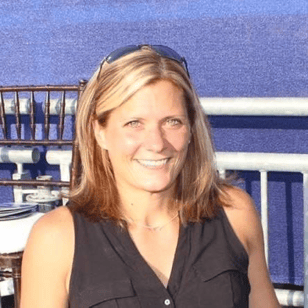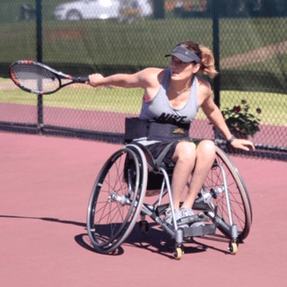Moving Forward: Jen Speer - Reeve Foundation
By Jen Speer
In 1995, I was a junior in college and a three-sport athlete. I was on track to graduate, and life was going exactly as planned. Early on the morning of January 5, while traveling to a basketball tournament, the van carrying me and my teammates pulled into the path of an oncoming truck. 
I woke up in a hospital bed, and doctors told me I had broken my back. Along with that came the news that I would never walk again. It’s hard to explain the cascade of thoughts that rush through your head when you hear those words, but I never doubted that I would conquer this unwanted challenge. Even if my legs no longer worked, I was going back to school, and I was getting my life back. With the unwavering support of my family and the skills I learned playing organized sports, I faced the next phase of my life head-on.
I spent the next several months at a rehabilitation hospital, learning how to do the basics – dress myself, get in and out of bed, and push a wheelchair as blisters formed on my palms. Suddenly, the easy things in life were hard. Basic bodily functions that I never had to think about before the accident caused daily worry. There were good days and bad days, and it seemed like it would never end, but after two months, I was discharged to my home.
Not yet able to care for myself independently, I went to California to live with my parents and participate in outpatient therapy sessions. It was then that I started to understand how different I had become to the outside world. I no longer fit the mold. I still felt like my regular self, but suddenly strangers stopped me in the grocery store to ask me personal questions. Social norms didn’t seem to apply to me anymore. It was jarring, and it still is when it happens, but I learned to only concern myself with the people I care about most. The number of “friends” lessened, but the ones that remained were, and continue to be, the special ones. Those are the friends that last a lifetime.
After completing my outpatient rehabilitation, I returned to school and finished my undergraduate degree. I then decided to attend graduate school, so I relocated to Washington, D.C., where I attended George Washington University. I received a master’s degree in speech-language pathology (SLP), and following graduation, I began my career as an SLP in the medical field.
For me, immersing myself in school and starting a career was highly beneficial in my recovery. It gave me a purpose, and it allowed me to focus on things not related to my injury. As I settled into my career and became more comfortable in my job, I started to feel like something was missing. It was hard for me to understand at the time, but as I look back now, I recognize there was an underlying discomfort of always being the different one. I was good at my job, and I had plenty of friends, but I was the only wheelchair user I knew. At the time, I didn’t think it mattered, but knowing what I know now, it was huge. I needed peers who understood my unique circumstances.
Living in the D.C. area brought many challenges, not the least of which was the snow. The snow was not my friend, and after several unpleasant experiences, I decided it was time to move to a warmer climate. I relocated to Atlanta, and I began working at Shepherd Center, a rehabilitation hospital specializing in brain and spinal cord injury, as well as multiple sclerosis, spine and chronic pain, and other neuromuscular diseases. This opportunity not only offered me an amazing job working at one of the top-ranked rehabilitation hospitals in the country, but it also exposed me to a world where wheelchairs are the norm. It felt like my entire world opened up. I was no longer THE girl in a wheelchair, and for the first time in years, I was able to blend in. There were people like me in every hallway. 
While utilizing the adaptive gym, I found myself watching the wheelchair basketball team practice. Soon, thanks to a welcoming group of players, I was shooting hoops and sprinting up and down the court like I used to, except on wheels. I was once again part of a team, and it was exhilarating. I hadn’t realized how much had been taken from me when I no longer had athletics in my life. Being at Shepherd Center offered me the unique opportunity to try out a multitude of adaptive sports, including basketball, softball, tennis, and snow skiing, so I could determine which one best suited me at this stage of my life.
I have settled on tennis, and it has been one of the most impactful things to happen since my injury. Not only is it an enjoyable way to stay fit, but the environment is unlike any other. It took me a while, but I finally found my place in the world again. There will always be frustrations and challenges that accompany a spinal cord injury, but for me, going outside and playing tennis with friends allows me time to feel normal. It’s a world where people pass by and tell you how impressed they are, instead of how sorry they feel for you.
I hope that everyone living with a disability would find something that brings them joy – something that gives them a safe space and offers a place where they can feel comfortable around people who understand. It’s different for everyone, but it’s out there, you just have to be willing to explore.
This blog appears courtesy of Shepherd Center. Shepherd Center, located in Atlanta, Georgia, is a private, not-for-profit hospital specializing in medical treatment, research and rehabilitation for people with spinal cord injury, brain injury, stroke, multiple sclerosis, spine and chronic pain, and other neuromuscular conditions. Founded in 1975, Shepherd Center is ranked by U.S. News & World Report among the top 10 rehabilitation hospitals in the nation.
Join Our Movement
What started as an idea has become a national movement. With your support, we can influence policy and inspire lasting change.
Become an Advocate